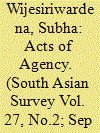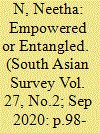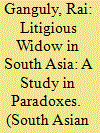|
|
|
Sort Order |
|
|
|
Items / Page
|
|
|
|
|
|
|
| Srl | Item |
| 1 |
ID:
174930


|
|
|
|
|
| Summary/Abstract |
In Sri Lanka, abortion continues to be a criminal offence under the Penal Code of 1883. Several attempts have been made to challenge the colonial-era law since the 1990s with no success thus far. This study documents and centres the knowledge of women and transpersons in accessing abortion and sexual health and reproductive health services in Sri Lanka in order to contribute to the conversation on abortion law reform as well as research and advocacy. Our data suggest that the existing legal reforms proposed to the abortion law would be unresponsive to the needs of women and transpersons in Sri Lanka, and that in additional to legal changes, we would need significant social and cultural changes. This study uses feminist research methodologies, building towards a feminist ethics in abortion research.
|
|
|
|
|
|
|
|
|
|
|
|
|
|
|
|
| 2 |
ID:
174925


|
|
|
|
|
| Summary/Abstract |
In India, formation of NGO-aided self-help groups (SHGs) for production was seen as an important step to lift women out of economic marginalisation and, thus, for women’s empowerment. With changes in economic policies, challenges of wage employment for women were also assumed to have been addressed. In this context, this article, drawing from the history of empowerment discourse and its obsession with the economic aspect, examines women’s employment and its multiple dimensions The analysis provides insights into the gender-based inequalities in the labour market which are evident in the concentration of women workers in precariat, feminised jobs either under the control of the family or without any recognition or legal protection. The prevalence of regressive gendered ideologies in employment and in the division of housework raises critical questions about the understanding of the two critical pillars of empowerment, namely, choice and agency.
|
|
|
|
|
|
|
|
|
|
|
|
|
|
|
|
| 3 |
ID:
174932


|
|
|
|
|
| Summary/Abstract |
This paper explores and assesses the presence/absence of institutional arrangements in educational settings for addressing the concerns of gender-variant children (GVC) through a sample survey of schools in the three-country context of India, Sri Lanka and Nepal. This research highlights the need for effective regulatory, normative and cognitive structures to address issues of childhood gender variance. With a contextual analysis of recent developments and comprehensive study of data reports in the three countries, the study analyses multiple dimensions of discrimination and bullying of GVC in educational settings. Using qualitative and quantitative methods, this paper highlights causes and issues associated with the problems of GVC as well as affirmative actions and institutional practices required to be implemented in schools in the three-country context. The results and findings provide evidence that academic institutions in India, Sri Lanka and, to some extent, Nepal lack institutional mechanisms to address issues of homophobia, abuse by peer group, mental health issues, emotional challenges, social discrimination, lack of opportunities, lack of monitoring and counselling, micro-level engagements and high dropouts of GVC. This study also charts out futuristic agenda, such as comprehensive mapping of GVC in schools, implementation of effective counselling mechanism, the need to create and adopt basic reference module for educators around gender diversity and variance.
|
|
|
|
|
|
|
|
|
|
|
|
|
|
|
|
| 4 |
ID:
174933


|
|
|
|
|
| Summary/Abstract |
While widowhood in India is synonymous to destitution – economically and symbolically – the right of widows as primary heirs with equal property rights as men owes its advent to both colonial and postcolonial lawmaking. Feminist discourses have since found these laws lacking both in gender neutral conceptualisations, as well as fruitful implementation. Within the present market-driven economy where land is a primary productive resource, the idea of a widow as a legal actor to claim property is an anathema, especially in a rural, agrarian setting. Rarely, she becomes the individual who must address the law, given her identity is subsumed under the rubric of family and work, and imbued with the circumstance of ‘have-nots’ facing difficulty in ‘coming out ahead in litigation’ against their superiors. Even as ‘a field of one’s own’ promises sustainable livelihood, status and increased bargaining power for women, can the widow successfully activate the legal system and gain land as property? I will engage with this paradox from the viewpoint of the Bengali Hindu widow; taking into account parallel developments in the fate of widows in other South Asian countries, where widowhood acquires similar social meanings due to shared gendered norms. The aim is to compare, contrast and analyse the specificity that post-colonial law making in India, especially Bengal, has brought about in the widows’ position in the society.
|
|
|
|
|
|
|
|
|
|
|
|
|
|
|
|
| 5 |
ID:
174924


|
|
|
|
|
| Summary/Abstract |
Gender issues, in South Asia, have been evolved and shaped by the political economics, cultural politics, state policies, social discourses and movements in the region. Gender status, in South Asia, is sustained through the existence of a gendered social order propagated through customs, cultural beliefs and laws reinforced to ‘control’ women through sanctions, violence, suppression of human rights, etc. This ‘hierarchical opposition’ (Dumont, 1966 [1980]) in gender dynamics is vastly removed from the dualism of ancient Indian philosophy where the pairs—male/female—may be different are not essentially superior or inferior to each other but are harmonious (Natarajan, 2001). In early societies, in the subcontinent, gender stratification existed but men and women had collective contributions to work and rights to resources. As the states and class structures emerged, differences between subjectivities (male and female) were constructed in socio-economic, theological and political discourses propagating conservative views of female sexuality and subjecthood. The cultural interventions and distortions due to centuries of invasions and the colonial past have also contributed to developing a parochial mind-set much in contrast with progressive Indian philosophical traditions. In India, ‘starting from ancient times to modern management stories, there is no dearth of legendary narratives of women empowerment, extraordinary women leaders and philosophers’ (Kar, 2019, p. 97) who overcame popular prejudices and barriers to bring qualitative changes in the social structures.
|
|
|
|
|
|
|
|
|
|
|
|
|
|
|
|
| 6 |
ID:
174934


|
|
|
|
|
| Summary/Abstract |
The advent of online matrimony ushered in a new era of matchmaking in the wake of globalisation. This paper aims to examine the impact of globalisation on Hindu–Bengali matrimony. The study attempts to find out the impact of online matrimony on marriages in Kolkata. On the basis of personal interviews and content analysis of advertisements in newspapers and online matrimonial websites, the study shows the impact of globalisation on the institution of marriage. The paper argues that globalisation has not made potential changes in the process of selection of prospective brides and grooms. The newspapers and online portals function as the twin matchmakers in contemporary Kolkata, with little difference from the way traditional matchmakers used to work. The paper examines the fate and impact of technology when introduced in deeply entrenched traditional social institutions. The increase in the pool of selection of mates has reinforced patriarchal ties with globalisation adjusting itself in a tradition-bound society, putting tradition and technology in a curious and cumbersome paradox.
|
|
|
|
|
|
|
|
|
|
|
|
|
|
|
|
|
|
|
|
|